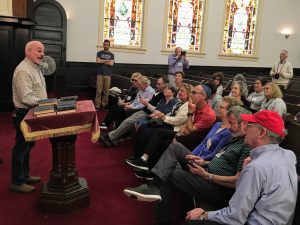Freedom Seder – A Weekly Letter From Rabbi Davis – April 19, 2019
Shalom Chaverim
Since returning from the Beth El civil rights trip to south, I’ve been sharing insights from the trip. Allow me to share one final, short thought in preparation for Pesach.
In 1965, a newly published Haggadah was dedicated to the memory of James Chaney, Andrew Goodman and Michael Schwirmer. They were three civil rights activists from the north who were murdered in Mississippi by the Klan the previous year. We learned about these three at the civil rights museum in Atlanta and about many others who risked and in some cases, gave their lives for the cause of freedom.
Of course, we shouldn’t romanticize and think that all Jews were on the right side of history like Goodman and Schwirmer (Chaney was their local, African American contact). We learned in the synagogue in Selma that some local Jews joined the march. Others were segregationists and part of the Klan. But the majority just tried to keep their heads down because they were scared. Remember, there had been a bombing of a synagogue in Atlanta and two attempted bombings in Birmingham synagogues. Jews didn’t want to draw attention to themselves or loose their livelihood. So, they mostly went about their daily lives. It’s easy for us to judge them. But harder to say what we would have done in their situation.
Our tour guide, Ronnie Leet, was one such Jew. In his 60s, he is the youngest of Selma’s remaining four Jews. We met him at the synagogue, Mishkan Israel that he is hoping to preserve.
 Leet told us his story: Growing up in an all-white grade school, he had little interaction with the black community. His family owned a small business and when the marches started, he parents told him to keep a low profile. It wasn’t until he went away to college that he gained a new perspective on how he had been living. When he came home from school for winter break, his mother asked him to give their black maid a ride home. When she went to get in the back seat of the car, he told to her, “No, you can sit here, in the front seat.” To us, such a small act sounds obvious and trivial in the face of racial terror. But to the maid, it was a simple recognition of her humanity. And for Leet, it represented a change of heart and a challenge to the status quo.
Leet told us his story: Growing up in an all-white grade school, he had little interaction with the black community. His family owned a small business and when the marches started, he parents told him to keep a low profile. It wasn’t until he went away to college that he gained a new perspective on how he had been living. When he came home from school for winter break, his mother asked him to give their black maid a ride home. When she went to get in the back seat of the car, he told to her, “No, you can sit here, in the front seat.” To us, such a small act sounds obvious and trivial in the face of racial terror. But to the maid, it was a simple recognition of her humanity. And for Leet, it represented a change of heart and a challenge to the status quo.
We might not all be brave enough like Chaney, Goodman and Schwirmer to risk our lives. But sometimes even small acts can make a difference and demonstrate our values.
The Haggadah dedicated to the “Freedom Summer murders” asks participants to remember that they were once slaves and to “hold high the torch of liberty and rededicate themselves to the never-ending battle for freedom.” Most striking is its conclusion. At the end of the seder, we say, “Next year in Jerusalem.” This Hagaddah, however, changes the language and has everyone say, “L’shana haba b’nai chorim. Next year may we all be the children of freedom.” In other words, in this hagaddah, the seder ends with the recognition that people are still not free. It ends with the reality of injustice but with the hope of redemption. That was true in 1965 and it remains true today.
May the seder inspire us each in our own way to invite those who face discrimination to move up to the front seat to sit beside us.
Chag Kasher v’Sameiach,
Rabbi Alexander Davis
adavis@bethelsynagogue.org
